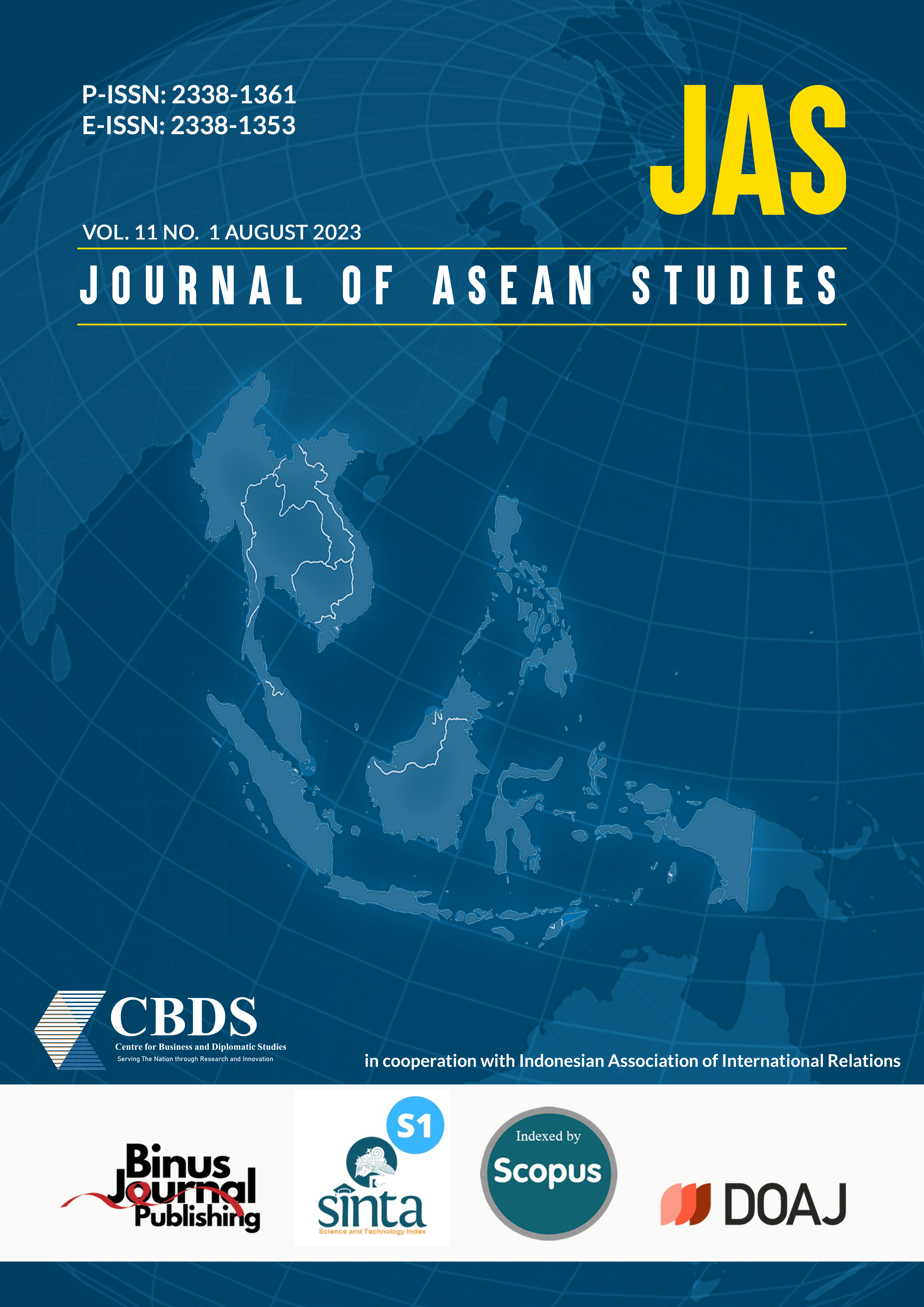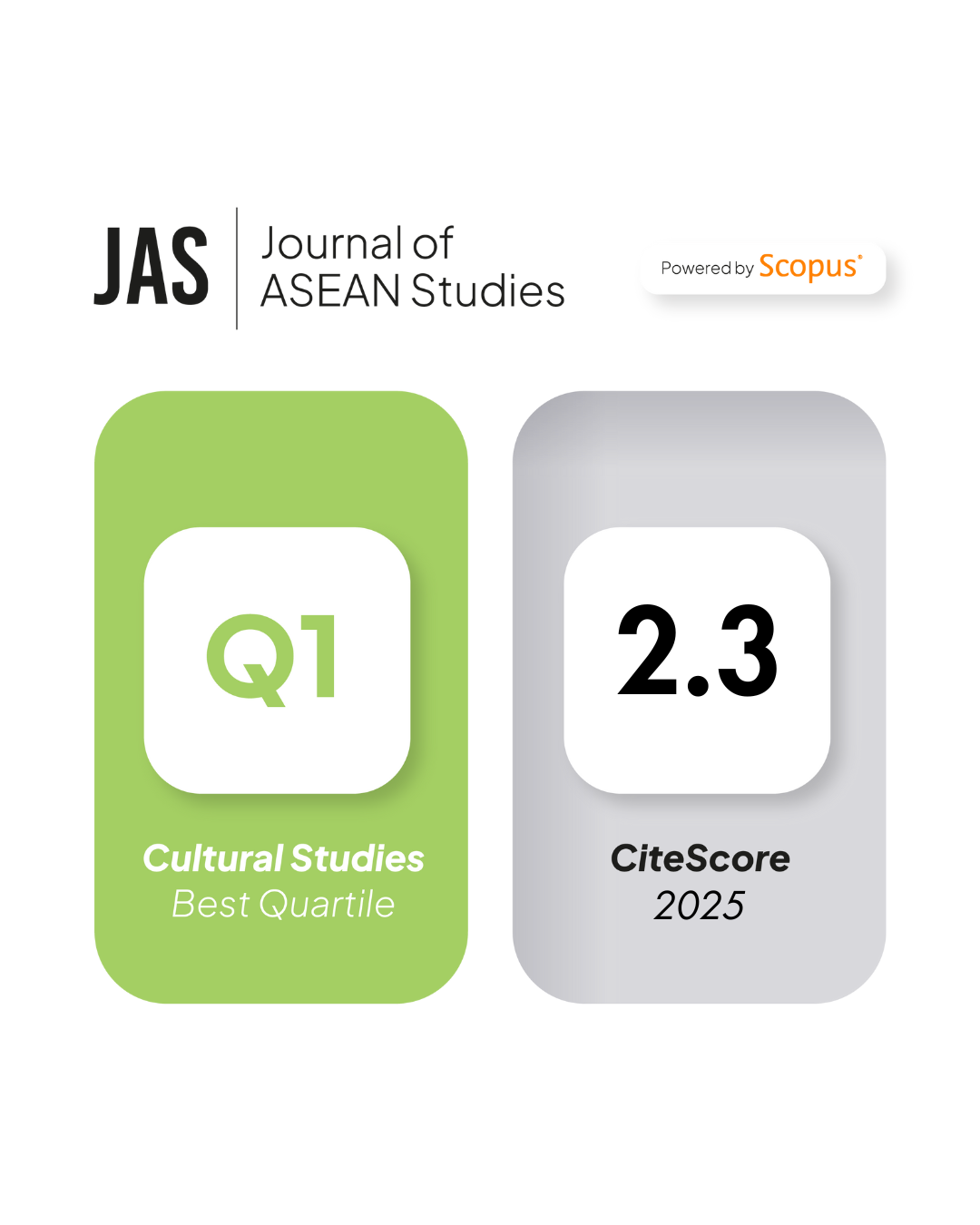Agenda Setting within ASEAN: Thickening, Broadening, and Breaking Pressures
DOI:
https://doi.org/10.21512/jas.v11i1.9035Keywords:
thickening, broadening, breaking, path dependency, normsAbstract
The Association of Southeast Asian Nations (ASEAN) is a clear example of an “organized anarchy†within agenda setting literature; meaning that ASEAN has problematic preferences due to its multiple conflicting goals, relies on unclear methods to accomplish those goals, and experiences fluid participation of its members and leaders. This leaves the organization a case study in the path dependency of norms, as ASEAN typically defaults to its founding principles of non-interference, economic inter-connectivity, and regional “centrality†during crises. The research question was on the examples of variation when ASEAN broadens the scope of its mission. The research aimed to answer by framing ASEAN as a subsystem of Southeast Asian regionalism and conducting a comparative historical analysis of three case study periods: the creation of the ASEAN Regional Forum (ARF), the failure to reach a joint communique in 2012 over tensions in the South China Sea, and the ongoing crisis of human rights and governance in Myanmar. The case studies demonstrate that the most effective broadening forces for ASEAN are exogenous. The conclusion argues that this is a problematic status quo for a regional organization that seeks to promote its centrality to counter interference from outside powers.
References
“The Founding of ASEAN,” https://asean.org/about-asean/the-founding-ofasean/#:~:text=History%20%2D%20ASEAN&text=The%20Association%20of%20Southeast%20Asian,%2C%20Philippines%2C%20Singapore%20and%20Thailand.
Zone of Peace, Freedom and Neutrality Declaration. (1971, November 27) International Center for Not-For-Profit Law. https://www.icnl.org/wp-content/uploads/Transnational_zone.pdf
ASEAN leaders demand immediate end to ‘unacceptable’ killings in Myanmar, following emergency summit. (2021, April 24). ABC News. https://www.abc.net.au/news/2021-04-25/asean-myanmar-summit-min-aung-hlaing/100093328
Ashley, R., & Silverberg, E. (2022). Japan’s human rights diplomacy: A convergence of geopolitical and geoeconomic interests. Asia Policy, 17(2), 138-144.
Ba, A. (1997). The ASEAN regional forum: Maintaining the regional idea in Southeast Asia. International Journal: Canada’s Journal of Global Policy Analysis, 52(4), 635-656. https://doi.org/10.1177/002070209705200408
Baumgartner, F. R., & Jones, B. D. (2005). The Politics of Attention: How Government Prioritizes Problems. University of Chicago Press: Chicago.
Bower, E. Z. (2012). China reveals its hand on ASEAN in Phnom Penh. CSIS. https://www.csis.org/analysis/china-reveals-its-hand-asean-phnom-penh.
Chiou, Y. (2010). Unraveling the logic of ASEAN’s decision‐making: Theoretical analysis and case examination. Asian Politics & Policy, 2(3), 371-393. https://doi.org/10.1111/j.1943-0787.2010.01199.x
Cohen, M., March, J. G., & Olsen, J. P. (1972). A garbage can model of organization choice. Administrative Science Quarterly, 17(1), 1-25. https://doi.org/10.2307/2392088
Factbox: ASEAN’s five-point peace agreement on the crisis in Myanmar. (2022, February 17). Reuters. https://www.reuters.com/world/asia-pacific/aseans-five-point-peace-agreement-crisis-myanmar-2022-02-17/
Feraru, A. S. (2016). ASEAN decision-making process: Before and after the ASEAN Charter. Asian Development Policy Review, 4(1), 26-41. https://doi.org/10.18488/journal.107/2016.4.1/107.1.26.41
Francisco, R. (2012, April 13). Beijing-Manila standoff deadlocked even as ships leave. Reuters. https://www.reuters.com/article/uk-philippines-china/beijing-manila-standoff-deadlocked-even-as-ships-leave-idUKBRE83C12S20120413
Haddick, R. (2012, August 03). Salami slicing in the South China Sea. Foreign Policy. https://foreignpolicy.com/2012/08/03/salami-slicing-in-the-south-china-sea/
Hayton, B. (2014). The South China Sea: The Struggle For Power in Asia. Yale University Press: New Haven.
Hook, G. D. (2009). Japan and the ASEAN Regional Forum: Bilateralism, multilateralism or supplementalism? Japanstudien, 10(1), 159-188. https://doi.org/10.1080/09386491.1999.11826848
Jones, D., & Michael L. R. Smith. (2007)). Making Process, Not Progress: ASEAN and the Evolving East Asian Regional Order. International Security, 32(1), 148-184. https://doi.org/10.1162/isec.2007.32.1.148
Kurlantzick, J. (2021, March 22). Myanmar’s Junta Tries to Follow the Thailand Model for Legitimizing its Rule – But it is Unlikely to Succeed. Council on Foreign Relations. https://www.cfr.org/blog/myanmars-junta-tries-follow-thailand-model-legitimizing-its-rule-unlikely-succeed
Mitchell, T. (2016, July 13). China struggles to win friends over South China Sea. Financial Times. https://www.ft.com/content/a9a60f5e-48c6-11e6-8d68-72e9211e86ab
Myanmar shadow government sets up office in South Korea. (2021, September 18). Nikkei Asia. https://asia.nikkei.com/Spotlight/Myanmar-Crisis/Myanmar-shadow-government-sets-up-office-in-South-Korea
Myanmar: ASEAN’s failed ‘5-Point Consensus’ a year on. (2022, April 22). Human Rights Watch. https://www.hrw.org/news/2022/04/22/myanmar-aseans-failed-5-point-consensus-year#:~:text=Gen.,to%20meet%20with%20all%20parties
Myers, L. (2021, September 10). China is hedging its bets in Myanmar. Foreign Policy. https://foreignpolicy.com/2021/09/10/china-myanmar-coup-national-league-for-democracy/
Permanent Court of Arbitration, “The South China Sea Arbitration (The Republic of Philippines v. The People's Republic of China),” Case Number: 2013-19, 22 January 2013, https://pca-cpa.org/en/cases/7/
Peters, C. (2021, June 20). The UN condemned Myanmar’s coup. Will that matter? Vox. https://www.vox.com/2021/6/20/22542370/myanmar-coup-united-nations-un
Petri, P. A., & Plummer, M. (2020, November 16). RCEP: A new trade agreement that will shape global economics and politics. Brookings. https://www.brookings.edu/blog/order-from-chaos/2020/11/16/rcep-a-new-trade-agreement-that-will-shape-global-economics-and-politics/
Petty, M. (2017, April 10). At strategic shoal, China asserts power through control, and concessions. Reuters. https://www.reuters.com/article/us-southchinasea-china-philippines-exclu/exclusive-at-strategic-shoal-china-asserts-power-through-control-and-concessions-idUSKBN17B124
South-East Asia’s regional club faces its greatest tests yet. (2021, October 30). The Economist. https://www.economist.com/asia/2021/10/30/south-east-asias-regional-club-faces-its-greatest-tests-yet
Strangio, S. (2021, March 23). Should R2P Be Invoked in the Case of Myanmar? The Diplomat. https://thediplomat.com/2021/03/should-r2p-be-invoked-in-the-case-of-myanmar/
Thayer, C. A. (2012, August 19). ASEAN’s Code of Conduct in the South China Sea: A Litmus Test for Community-Building? The Asia-Pacific Journal. https://apjjf.org/2012/10/34/Carlyle-A.-Thayer/3813/article.html
Thul, P. C. (2022, January 07). Cambodia PM meeting Myanmar junta chief as visit sparks protests. Reuters. https://www.reuters.com/world/asia-pacific/cambodia-pm-visit-myanmar-pressing-peace-plan-2022-01-06/
Timeline: China’s Maritime Disputes. Council on Foreign Relations, https://www.cfr.org/timeline/chinas-maritime-disputes
United Nations Conference on Trade and Development. (2016). Review of Maritime Transport: 2016. https://unctad.org/system/files/official-document/rmt2016_en.pdf
West condemns Myanmar coup but Thailand, Cambodia shrug. (2021, February 1). Bangkok Post. https://www.bangkokpost.com/world/2060651/west-condemns-myanmar-coup-but-thailand-cambodia-shrug
Downloads
Published
How to Cite
Issue
Section
License
Copyright (c) 2023 Ryan Ashley

This work is licensed under a Creative Commons Attribution-NonCommercial 4.0 International License.


























